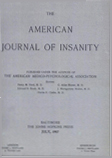THE STATE HOSPITAL TRAINING SCHOOL FOR PSYCHIATRIC NURSING
Abstract
The function of institutions for the ill of mind has changed from the custodial to the remediable. An adequately equipped nursing staff is one of the chief means by which this new function can be realized. This nursing staff should be composed of those prepared primarily to care for mental patients, that is, psychiatric nurses. Psychiatric nurses should receive interpretative psychiatric training. It has been questioned if the State Hospital Training School is preparing nurses for psychiatric duty as efficiently as might be done with the practically unlimited facilities available. Nurses would be better equipped to aid in the rehabilitation of the patients if more emphasis were placed on the psychiatric phases of their training and if the content of the psychiatric courses was less a matter of disease entities and symptoms but aimed more at bringing the nurse into a psychological understanding of the socalled abnormal mental conditions. Any efficient psychiatric training under the conditions in which the state hospital nurse is placed must begin intensively with the pupil's entry into the service. As now organized the State Hospital Training School is not satisfying these desiderata.
This is a field well meriting thoughtful consideration and this contribution should not be looked upon as a piece of radical and destructive criticism. The positions taken are justified and highly pragmatic and are presented in a constructive attitude with the hope that in them the hospital executive may find a stimulus to a readjustment of his training courses to the end that better educational values may be established, and that the state hospital nurse may genuinely aid in enabling her patients to adjust themselves to the situations of life.
Access content
To read the fulltext, please use one of the options below to sign in or purchase access.- Personal login
- Institutional Login
- Sign in via OpenAthens
- Register for access
-
Please login/register if you wish to pair your device and check access availability.
Not a subscriber?
PsychiatryOnline subscription options offer access to the DSM-5 library, books, journals, CME, and patient resources. This all-in-one virtual library provides psychiatrists and mental health professionals with key resources for diagnosis, treatment, research, and professional development.
Need more help? PsychiatryOnline Customer Service may be reached by emailing [email protected] or by calling 800-368-5777 (in the U.S.) or 703-907-7322 (outside the U.S.).



